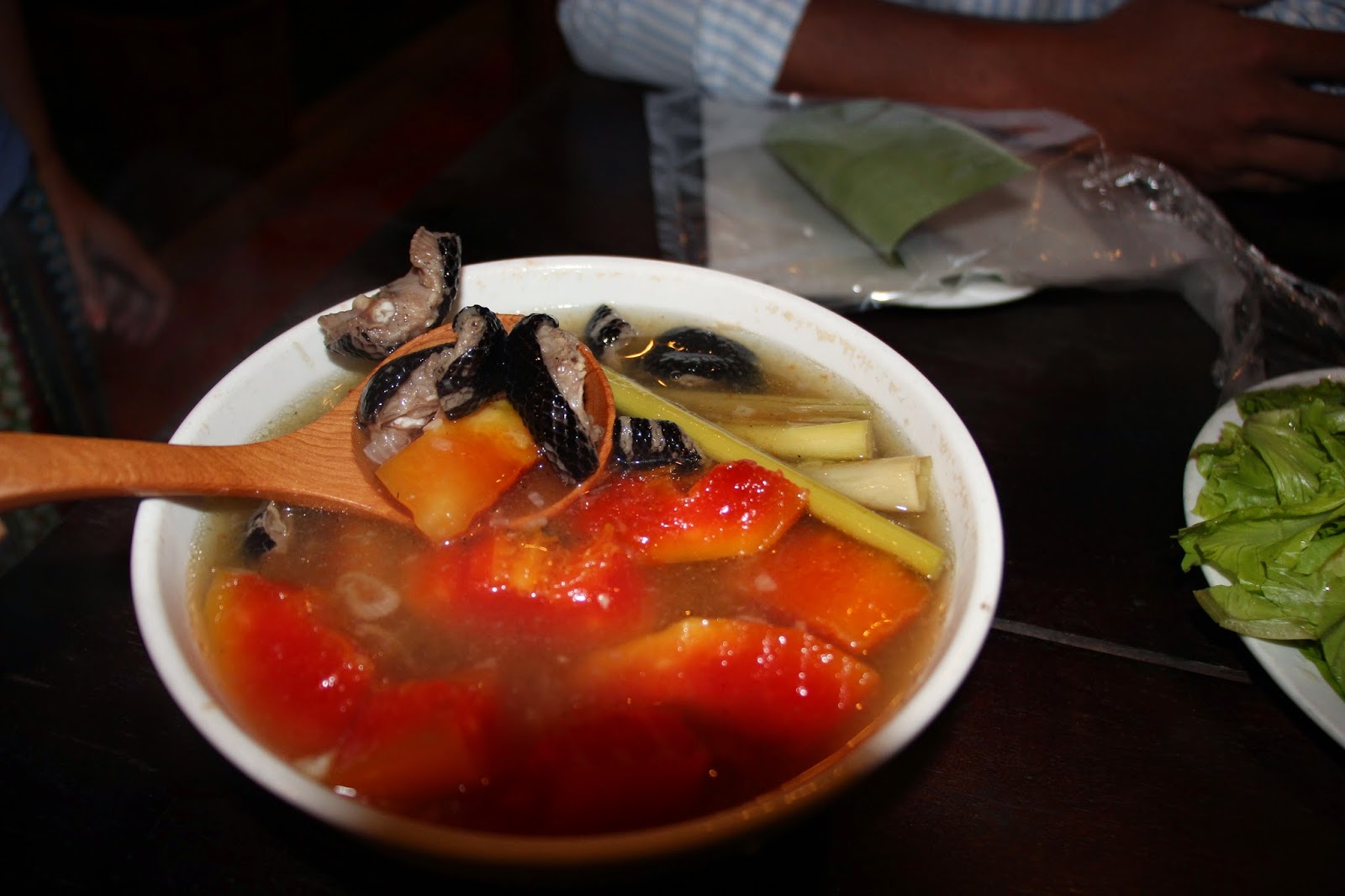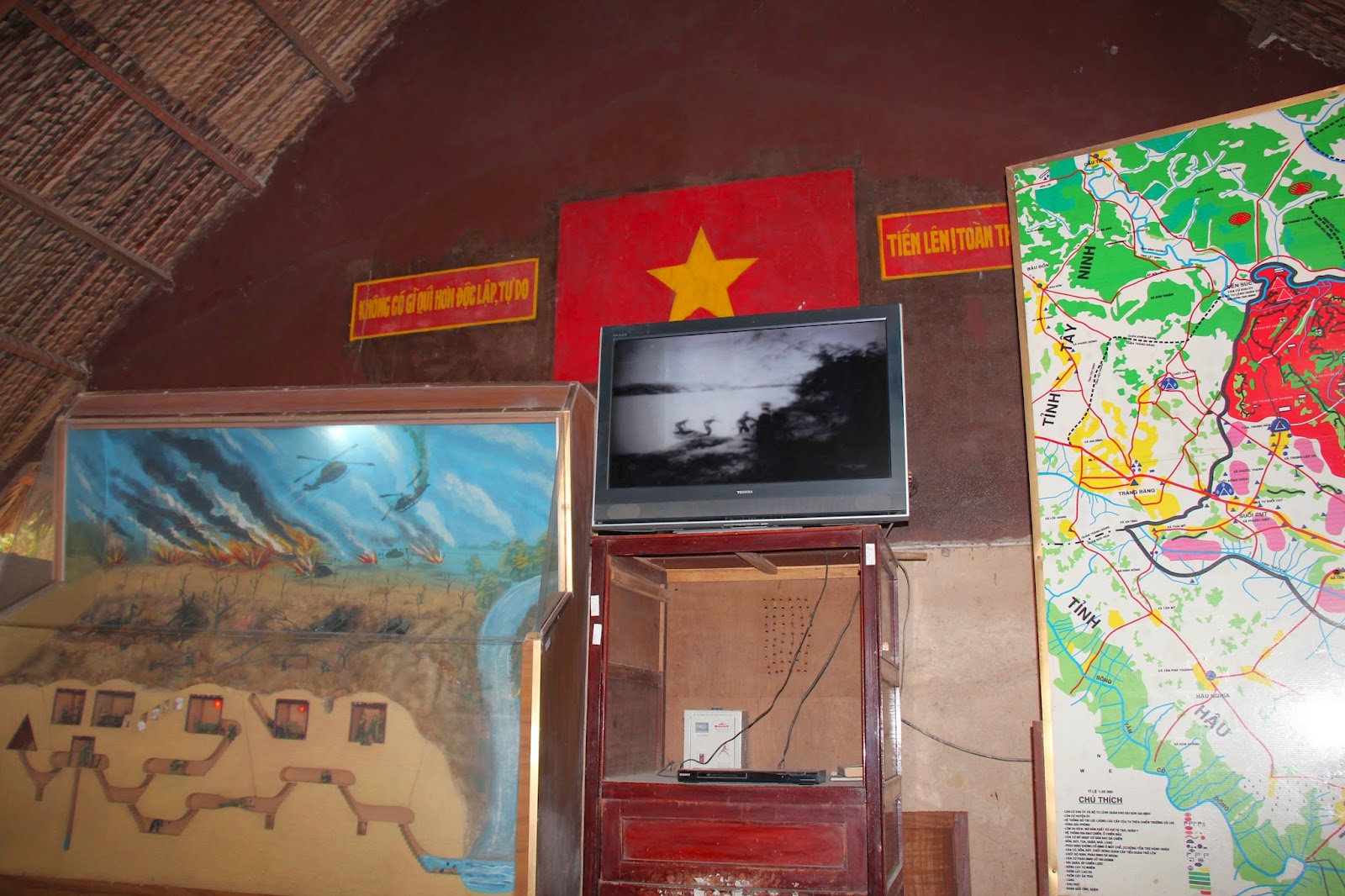Week 8:
Feb 19th - 26th
As I think back on my past week in Vietnam, my mind is flooded with images of faces, streets, plants, buildings, rivers, boats, and food. Endless amounts of food. Since I've returned to Saudi Arabia, I have been unable to find the time or motivation to just sit down and write about my experiences. A part of this may be a result of the fact that upon returning home to Saudi I had less than twenty-four hours to recover from my travels before delving head first into professional development work, as well as cramming in time to grade, lesson plan and prepare for the busy week of traditional schooling ahead.

My week in Vietnam was not a vacation. I travelled to Ho Chi Minh City with twenty four teenagers and two colleagues. Every waking hour of the day was spent looking after the well-being and safety of my students and ensuring that rules were being followed and cultural appreciation and respect were being cultivated. For the most part, my students were pleasant and easy-going. I had the good fortune of traveling with two wonderfully easy-going and supportive colleagues who made our work as chaperones an enjoyable and stress-free experience. The majority of our students behaved maturely and embraced the numerous learning opportunities presented to them throughout the trip. They tried new foods, spoke earnestly with locals and kept their eyes and ears open to the different sounds and sights around them. Out of twenty-four students there were only four kids who drove me to the point of frustration. They were typical teenage boys -- complaining every second about the food, the bugs, the dirtiness and constantly mocking the people and accents and differences all around them. While their behavior bothered me, I suppose it was typical. They were teenage boys out of their comfort zone. And what do teenage boys do when they are unconfident or unsure of themselves? They grasp on to what is familiar to them: in this case, resorting to scarfing down Cup of Noodles, Starbucks, and Burger King every day instead of partaking in the delicious local cuisine prepared for us. They made fun of the way the locals talked and acted, obviously feeling insecure about their own appearance and inability to communicate in this foreign land. As a mature adult, I can understand their behavior and I know why they acted the way they did, but that still doesn't excuse it.

On our first day we arrived in Ho Chi Minh City and were greeted by a bright smiling face, our guide for the week, Xuyen (pronouced Soo-yin). She told the students to call her "Sunny" and throughout the week, Xuyen proved herself to be our bright and guiding light. We boarded a bus and travelled through the labyrinth of the city to get to our hotel. My face was glued to the window the entire time. We had so happened to arrive in Vietnam a few days after their new year celebration. Every building was covered with posters and banners and the simple Vietnamese red flag with a yellow star. Communist flags were displayed prominently on streets posts and wide avenues were draped with decorative lights and flowers. The city looked so positive and celebratory. I got the sense that the Vietnamese are fiercely proud of their country. When I asked Sunny about the communist government and how people feel about their government she shrugged her shoulders and said cooly, "most people don't really care". This attitude was confirmed as I walked about the city and then later through the small village we stayed at in the Mekong Delta. People genuinely are quite apathetic and aren't too eager about much in life. There was a kind and caring, but very lackadaisical attitude throughout the country.
After quickly settling into our lovely hotel right in the heart of Ho Chi Minh City, the Bong Sen Hotel of Saigon, we went for a brief walk down a few blocks to the famous War Remnants Museum.
It was a small museum and quite simple in terms of its featured items and war paraphernalia, however, it was brutally powerful. The majority of the museum is made up of photographs from the Vietnam war. These photographs were taken by Americans, French and Vietnamese people and painted a picture of a horrendous war that wreaked havoc on both sides of the battlefield. There was a entire room dedicated to the atrocities created as a result of exposure to Agent Orange. This room was particularly heart-breaking as it featured numerous photographs of babies, infants and grown adults suffering from deformities.

As I stood in the War
Remnants museum, staring at the grotesque photos of distorted, tortured, and
mutilated bodies, I couldn’t help but wish I could just burst into tears. I
wish I could cry openly, in front of strangers and my students. I wanted some way
to more authentically convey my guilt and shame and horror. I’m sorry, I couldn’t help but think to
myself as looked into the eyes of victims staring back at me from behind glossy
printed framed photographs, I’m just so sorry.

My feelings of guilt slowly
began to dissipate as I got back into “teacher mode” and walked alongside my
students as we departed the museum, heads down, contemplating all that we had
each privately experienced in the museum. Some students, I could tell seemed a
little bored. I understood, this wasn’t their history after all. Some other
students, however, were very moved and shocked by all that they had seen. Most
of them have learned very little about the Vietnam war. As we left the museum
and carefully crossed the busy street I kept my eyes protectively on all
twenty-four of their bobbing heads as they weaved through the bustling streets
of Ho Chi Minh. We stopped for a quick snack in front of the beautiful Notre
Dame Cathedral and Central Post Office – both buildings serving as powerful
reminders of the beautiful, but imposing, French influence in Vietnam.
 Our day concluded with a
delicious Vietnamese dinner of rice, sautéed veggies, beef, pork, chicken,
spring rolls and heaping plates of fruit for dessert. I stuffed my face silly,
relishing the unique flavors of new spices and styles of cooking I had never
before tasted. Little did my swollen belly know that every meal I would eat in
Vietnam for the next few days would be of a similar robust quantity and
variety. I ate like a child who has been starved for years. A sobering thought
considering the amount of starving children who live in Vietnam…
Our day concluded with a
delicious Vietnamese dinner of rice, sautéed veggies, beef, pork, chicken,
spring rolls and heaping plates of fruit for dessert. I stuffed my face silly,
relishing the unique flavors of new spices and styles of cooking I had never
before tasted. Little did my swollen belly know that every meal I would eat in
Vietnam for the next few days would be of a similar robust quantity and
variety. I ate like a child who has been starved for years. A sobering thought
considering the amount of starving children who live in Vietnam…
The following day, we
re-packed our bags and boarded a bus that would take us on a two-hour long
journey to the Mekong Delta. There we would be staying for three days to
contribute towards the renovations of a small local schoolhouse. My heart
flipped with glee at the chance to spend time in close proximity to water.
True, the river was muddy and not much to look at, but it still felt so
refreshing to be able to sit in a boat or stand on a dock and let the soft
rhythm of the current lull me into a state of mental clarity and calm.
 For two days, my
colleagues and I worked tiresomely alongside our students to dig up the poor
foundation of a two-room elementary school house and replace it with “better”
foundation materials. In a nutshell, here is what we did over two days:
For two days, my
colleagues and I worked tiresomely alongside our students to dig up the poor
foundation of a two-room elementary school house and replace it with “better”
foundation materials. In a nutshell, here is what we did over two days:
·
Broke up old
tile and concrete and carried the pieces outside
·
Used hands and
shovels and buckets to scoop up the old sand foundation and bring it to piles
outside
·
Carried rocks
from a pile outside and placed them inside to serve as the new foundation
·
Mixed sand and
concrete powder
·
Poured that
sand/concrete mix over the rocks
·
Watered the
sand/concrete mix
·
Placed tiles
over top of the new foundation.
It
was exhausting work and took all twenty-seven of us a long time to actually get
these basic jobs down. Students complained of headaches, tiredness, sore legs,
sore arms and general fatigue. My colleagues and I did not take to their
complaining nicely. I told many of my students to just suck it up and keep
going. I reminded many of them that we were only here for two days, imagine how
many fifteen year old Vietnamese kids have to do this same kind of work every
single day for the rest of their lives (with even less water and substance).
Most of my students have never had to lift a finger in their lives. Most of
them were raised by nannies and maids and drivers and have not had to endure
any sort of uncomfortable situation. I tried to stifle my feelings of anger and
frustration with so many of their lazy attitudes. I reminded myself that I
didn’t have to work when I was in high school either, but I did appreciate my
life and didn’t take anything for granted. It was very difficult not to get
angry at my students when they complained and mocked the way of life of the
Vietnamese people. Even now I’m trying to erase my malicious thoughts because I
do not want them to tarnish the beautiful images and experiences I made in
Vietnam.
Every
night in the Mekong Delta began with a delicious feast of homemade meals prepared
for us by local women. Dinner began with an appetizer of some kind, usually
some type of spring roll, tempura veggie, steam prawn or chicken piece. My
favorite appetizer of the entire trip was a stuffed pumpkin blossom. I don’t
know what was in it, but it was pure heaven. Then dinner arrived quickly which
was usually bowls of curried fish, chicken, beef or shrimp followed by
mountains of fresh sticky rice and aromatic soups. Steamed vegetables were
always served. Dessert was fresh slices of juicy fruit – pineapple, jackfruit,
dragon fruit, oranges, baby bananas, milk apple, red pear, lychee, and several
other names that do not have corresponding terms in English.
The
“home stay” we were staying in was a simple wooden house with approximately
twelve rooms that contained nothing more than elevated beds and mosquito nets.
Some of these rooms has private bathrooms, but most did not. To be honest, the
place struck me as rather touristy and I must say that I was somewhat
disappointed by the fact that there were western-style bathrooms and standing showers
with hot running water. Furthermore, I was horrified to discover that this
small Mekong Delta village had free WiFi! As you can imagine, the students were
thrilled. I, on the other hand, kept my thoughts to myself and stubbornly switched
my phone into airplane mode in an attempt to gain a more “authentic” experience.
I couldn’t help but compare everything to my experiences last year in Cambodia.
Truth be told, as wonderful as a trip I had in Vietnam, it just made me miss
Cambodia all the more. I know I will return there someday.
After
dinner, as our students huddled around hammocks and tables updating their
Instagrams and Facebooks with selfies from the trip, I sat off in a corner with
my two colleagues surreptitiously sipping wine and reflecting upon the day. I
loved not having access to my phone, I felt so much less stressed and delighted
in the opportunity to disconnect from the world for just a little while.
On
our last day in the Mekong Delta we visited the floating markets and went on a
pleasant rowboat ride down some of the river’s tributaries. It was so peaceful
to just float down the thin streams of water through villagers’ backyards and
gardens. We visited a coconut candy
factory and I ate enough free-samples of syrupy-sweet coconut confections to
last me a lifetime. It was also there that I sampled snake-infused “wine” (they
call it wine, when in reality it tasted a lot more like a black-licorice
flavored Jack Daniels). It was an experience, but one I would not care to
repeat.
From
the coconut candy factory we travelled to the famous Cu Chi tunnels. These
tunnels formed a secret underground city just outside Saigon that was used by
the Vietcong soldiers to launch secret attacks and traps against the Americans
during the Vietnam War. It was a terrifying place. It has been converted into a
popular tourist attraction, but that didn’t soften the fact that these tunnels represented
a central part of the Vietcong’s war strategy to terrify the naïve American
soldiers and inflict torture on any one opposed to the communist party. Some
tunnels had been widened to accommodate the fat foreign tourists who choose to
simulate the experience of living underground. I crawled approximately 500
meters through some of these, astounded that humans actually lived in these and
ate and slept and defecated and copulated in such oppressively confined spaces.
I am by no means claustrophobic, but I am a girl who needs her space.
Returning
to Ho Chi Minh felt like coming home. The students (and even us teachers) were
thrilled to be back in a hotel with freshly laundered sheets and private tiled
bathrooms devoid of spiders and flies. I took an extra long shower, washing
every single crevice of my body and shaving my legs to smooth perfection.
Blow-drying my hair felt like a glorious luxury. I had two hours to myself
before I had to round up the kiddos for dinner so I treated myself to a
seventy-minute massage.
It
was….hands down…the best massage of my life.
I
am a naturally flexible person and do yoga regularly so I have a pretty limber
body. But oh my god, this little Vietnamese masseuse stretched and pulled and
cracked every inch of my body. It was heaven.
Our
usual Vietnamese dinner feast did not disappoint. We went out for Vietnamese
BBQ, which was a lot like Korean BBQ. Raw meat is delivered to the table, which
has a hot grill in the middle. The meat is already seasoned and all you need to
do is just flip it over when it is cooked to your liking. As usual, I ate more
than I should have, but as usual, it was so worth it.

On
our final day in Vietnam we took the students to an orphanage for children with
special needs. Initially, I was nervous. What cruel ways would our students
think of to belittle or mock these children or orphanage supervisors? How would
they stifle their laughter at the misfortune of others? How would they roll
their eyes in disdain or stand there like emotionless zombie? I feared the
worst. Nothing seemed to reach into the souls of these children and move them.
I speak falsely, the majority of the students were rockstars…it was just those
four. Those four four four soulless teens that I could not erase from my mind
or peel my eyes away from. I watched their every move like a hawk, just waiting
for the opportunity to tell them off and demand that they show more respect.
Enforcing kindness may seem like an oxymoron, but I was determined to force
these self-entitled brats to care.
When
we arrived at the orphanage, just a few hours left to spare before our
departing flight, I found myself surprised by how clean the place was. We
removed our shoes at the entrance of the building and glided our sock-covered
feet across smooth tile. The ground floor was a giant play area with a generous
amount of free space that the children would use to roll around, crawl, dance
or shuffle across. The first group of children we saw were wheelchair bound.
Small, thin, disproportionate sized bodies strapped into high chairs and movable
walkers sat peacefully before us, not particularly interested in our presence,
but clearly attune to the fact that visitors had arrived. Sister Kim, the head
Catholic nun in charge of the Thien Phuc orphanage, informed us that half of
our group would be staying downstairs to feed and play with these children and
the other half would go upstairs to play with the “immobile” children. I wanted
to model the way my students should play with and approach these severely handicapped
kids so I stayed downstairs and instantly went up to a boy in a hair chair and
began to hold his hand and talk to him. I told my students that even though
these children don’t speak English and have limited language abilities in
general, it is still important to speak with them and make eye contact and
treat them with love and compassion. As more children emerged and began to play
with my students, I noticed a few of my female students crying. I comforted
them by telling them not to be sad or to pity these children, but to think
about how well they are cared for and to treat them compassionately.
Our
few hours spent at Thien Phuc orphanage were by far the most rewarding hours of
the trip. Every single student, even those four ungrateful boys, was engaged in
playing with the orphans and showing kindness and respect. I found myself
wishing that we could have spent our entire service week at this orphanage. I
think it would have had a much more significant impact on the students. Though
the aim of our school’s Week Without Walls trips is to foster an appreciation
for hard work, it is done so predominately through superficial physical labor.
Our students know that the work they do in building a school is not
particularly important. The locals are probably just going to re-do all the
work we had done anyway. Yet it is still important to feel those sensations of
tiredness, fatigue, exhaustion and pain. Our students are too sheltered from
these experiences and take the ease of their lives for granted.
The
orphanage visit had the most profound impact on the children because it was
authentic. It was direct human-to-human contact. The simple act of laying a
hand on the arm or shoulder of a child who cannot move or speak is more
powerful than any amount of physical labor our students could engage in.
Exchanging smiles, clasping hands, twirling together in dance, holding crayons,
feeding others – these are the actions that define true goodwill and service.
As
we prepared to leave the orphanage, one student went around collecting money
from everyone to give as a gift to Sister Kim to use in anyway she saw fit. We
raised approximately $300 in cash. It felt like such an insignificant amount of
money, especially considering how easily our students could blow through $300
each in just a single day of shopping, but Sister Kim assured us that it was
deeply appreciated. Several of my students came up to me and whispered how
embarrassed they were that they didn’t have more to give. I couldn’t help but
agree.
Vietnam
now feels like a whole lifetime away. The rich smells and sounds and tastes of that
diverse land have faded from my senses, but the images of the Mekong Delta
service site and faces of the orphans at Thien Phuc are still firmly imprinted
in my mind’s eye. As a teacher, I feel that all teenagers should be required to
participate in some form of service. Helping others, giving selflessly and
being kind are highly underrated skills in all educational systems. In today’s world we teach our students
to be independent, proactive, self-motivated and determined, but all these
skills are inherently selfish. The rise of social media and our growing addiction
to technology is making humans increasingly less social and more self-centered.
Genuine human-to-human interactions are being slowly replaced by virtual correspondence.
I am honestly fearful of the future. But I am also full of hope. My students
give me hope. My friends and family and colleagues give me hope. They give me
hope because no matter how difficult life becomes, or how removed I am from
their lives; they never cease to love me and support me. But love must never be taken for granted. It is the most precious gift on earth.




















